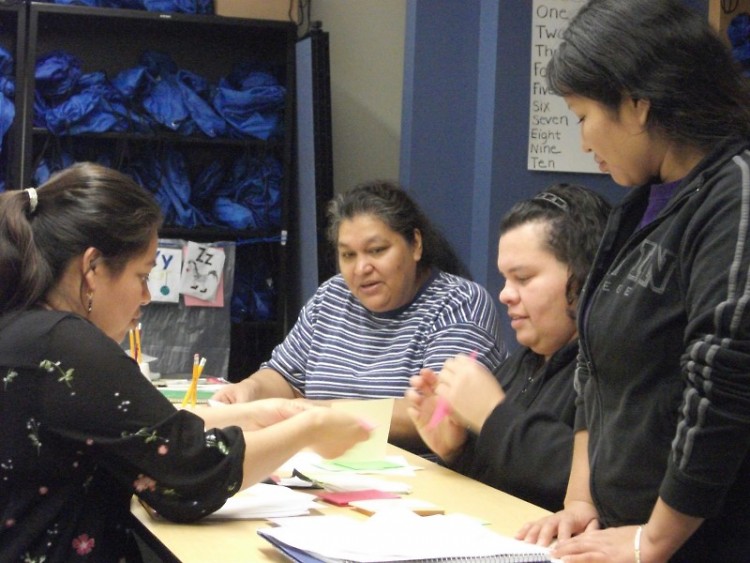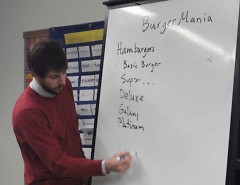By Kristin Brace, Community Literacy Program Assistant
When I walked into Dan Drust's classroom at Burton Elementary, I found a dozen women sitting around a trio of oblong tables intended for children. They had the aura of an extended family: chatting quietly as they helped one another with their work, someone occasionally making a comment that elicited a burst of laughter from the group. When class was over, I remarked to Dan how at ease everyone seemed. Dan said many of his students had been in class together the previous year with a different teacher, so they knew each other well before he became their instructor. In other words, he “didn't have to do any of the work” and felt lucky to have an already cohesive group. It turns out he's a pretty modest guy.
This is Dan's second year serving as an AmeriCorps member in the Family Literacy Schools of Hope program, a partnership between the Literacy Center of West Michigan, Heart of West Michigan United Way, and Grand Rapids Public Schools. Simply put, Dan's job is “working with parents to help the kids.” During the school year, he teaches two classes—one in the morning, one in the evening—to non-English speaking parents of Burton Elementary schoolchildren. He says that some of his students enter the classroom with a lot of English-speaking experience, others with absolutely none.
“We meet them where they are,” he said. “If we can help parents be literate in English—the language their kids are learning in—and we can help parents navigate the school system and learn about literacy related activities they can do at home with their kids, then we can help kids bridge the literacy gap in Kent County.”
In addition to improving literacy, Schools of Hope focuses on building community. Dan's students were planning a Christmas party before I came in. He may think he has little to do with the sense of camaraderie in his classroom, but chances are that Dan's relaxed yet energetic manner play a major role.
“Their enthusiasm reflects onto me, or maybe mine reflects onto them,” he said. “It's a two way street.”
I noticed a lot of give and take, encouragement from Dan met with a smattering of “terrifics!” from the class. Students felt comfortable asking questions. Though fluent in Spanish, Dan often answered questions asked in Spanish with an English response, coaxing his students to practice their non-native tongue. I noticed several good teaching tactics like this one, including Dan's use of simple, straightforward instructions paired with visuals or motions. He also gave students time to compare answers with one another, and asked for informal feedback on each activity's level of difficulty.
What's incredible about Dan's ability in the classroom is that he has no formal background in education. In college, he spent a lot of time in Spanish classes simply because he loved the language. His teaching experience started his senior year when he volunteered at The Word Project, an English as a Second Language (ESL) school run by Dominican sisters on the northeast side of Grand Rapids. He discovered that despite his love of the Spanish language, it wasn't as much a part of him as English.
“If I'm teaching Spanish,” he said, “I'm just teaching words and symbols. If I'm teaching English, I'm teaching my experience.”
This passion shone through in Dan's lesson. He reviewed the major points of a unit on food, as well as “count” and “non-count” nouns, before moving on to an interactive activity: a contest to see which of three teams could accurately meet the most hamburger orders for the made-up restaurant “BurgerMania.” While he follows the textbook as far as lesson content goes, Dan can be creative in planning his activities, especially at the end of a unit.
“They've learned the vocabulary, they have some grammar they can support the vocabulary with, and they're transferring that to a “real life” situation. I don't know how many of them are going to work in fast food next week,” he laughed, “but they know the situation where they'd use that language.”
The teams each had a “manager” with access to the toppings required on each burger, a “maker” who assembled burgers out of colored paper “ingredients,” and a “runner” who returned one order to Dan and received the next. Competition was lively, and Dan's students left in high spirits.
“I rarely leave this school with a frown,” Dan said. “The students are definitely the best part.”
After class, someone came in needing a translator. Dan was able to help. The continual language barrier is the biggest challenge his students face. Sometimes, this difficulty is compounded by a student's illiteracy in his or her native language. When he first began teaching, Dan was surprised to learn that a Spanish-speaking student could not fill out an in-take form which was written in Spanish.
“That was such an eye-opening moment,” he said.
He knew there were illiterate people, but not in his own backyard. It still comes as a surprise, and adds a new dimension to teaching, but Dan is up to the challenge and he is not without support. Burton Elementary is a Community School, and once a month, Dan meets with community partners who provide services locally. He can then refer his students to valuable resources of which they might otherwise be unaware.
Dan's commitment to the good of the community took an official form earlier this year when he was selected to be the LeaderCorps representative for Michigan. The focus of LeaderCorps is to spread the word about national service.
“As AmeriCorps members,” Dan explained, “we're not volunteering, and we're not working—we're serving. We have a commitment.”
The group's goal is to link AmeriCorps alumni and others with service projects in their area. Dan understands the difficulty in finding time to serve.
“But the truth is,” he said, “that nothing is going to get done if people aren't volunteering their time.”
Dan sees himself continuing to serve in the future, whether teaching English abroad, working at a non-profit, or being some sort of caseworker. He has the vision and the skill set to make a positive difference—not to mention a sense of humor and the willingness to improvise. One small example: during the BurgerMania activity, Dan remained cool as a cucumber when the “pickles” ran out.
While the future may be wide open, Dan is devoted to seeing his students at Burton Elementary thrive. He has seen their language skills improve as they gain confidence and familiarity with one another and the classroom setting. In many cases, they're fighting against the odds to be there at all.
“A lot of these families live in poverty,” Dan said of the population he serves. “A lot of them have poor living conditions. Maybe they don't know where their next meal is coming from. The cool thing is, despite all that, they're coming in every week and learning English. If you've ever learned a language, you know how taxing that is, and they're doing great. It's really a success story, in terms of their language learning and their motivation.”
The Rapidian, a program of the 501(c)3 nonprofit Community Media Center, relies on the community’s support to help cover the cost of training reporters and publishing content.
We need your help.
If each of our readers and content creators who values this community platform help support its creation and maintenance, The Rapidian can continue to educate and facilitate a conversation around issues for years to come.
Please support The Rapidian and make a contribution today.


